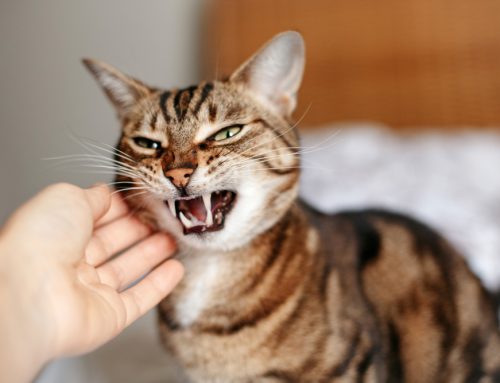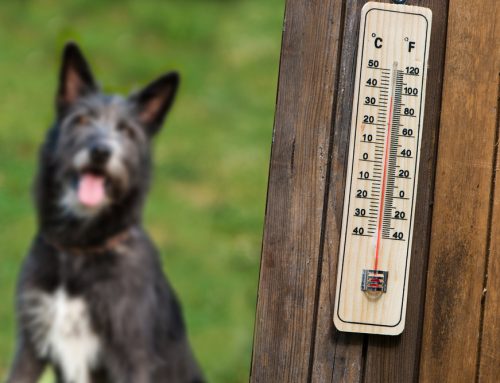Whether you have a puppy, kitten, or senior pet, their inquisitive nature can get them into trouble. To ensure your four-legged friend avoids household hazards, our Town & Country Animal Hospital team explains how you can make your home pet-friendly and prevent a veterinary emergency.
Make your kitchen pet-friendly
The kitchen is often the heart of the home, but the space often poses many hazards to pets. Make your kitchen pet-friendly by doing the following:
- Store food wisely — Many foods, such as chocolate, grapes, xylitol-containing products, onions, macadamia nuts, and raw yeast dough, are toxic to pets. To prevent your pet from being accidentally poisoned, store all food securely behind closed cabinet doors or in air-tight containers.
- Prevent dumpster diving — Some pets enjoy scavenging in the garbage, but they can encounter discarded toxic foods and ingest foreign bodies, such as plastic wrap and bones, which can cause a gastrointestinal (GI) obstruction. Keep your trash in sealed containers to help prevent your pet from dumpster diving.
- Close your dishwasher — Food aromas tend to linger on plates, bowls, and utensils placed in the dishwasher, potentially attracting your pet. When investigating these scents, your pet may injure themselves on sharp objects such as knives and serving forks. To prevent your pet from experiencing puncture wounds and lacerations, always keep your dishwasher closed.
- Use child-safety latches — Pets are clever, and they can learn to open drawers and cabinet doors. Use child-safety latches to impede precocious paws.
- Consider a pet gate — To prevent your pet from snatching a dropped food item, consider using a pet gate or restricting them to a crate while you prepare meals.
Make your living room pet-friendly
Many pets think the living room couch is their personal property, so you should ensure this area is safe for your four-legged friend. Make your living room pet-friendly by doing the following:
- Investigate your vegetation — Many common houseplants, including aloe, lily, philodendron, and dieffenbachia, are toxic to pets. Ensure the plants in your home are pet-friendly.
- Secure cords — Some pets chew electrical cords, potentially receiving a life-threatening shock. In addition, cords dangling from blinds and curtains can be hazardous to pets. To avoid a potential veterinary emergency, cover or secure all cords.
- Tidy toys — Put away toys and game pieces to prevent your pet from swallowing a foreign object.
- Consider your decor — A tail wag or paw swipe can easily knock over breakable decorative items, creating sharp fragments that may injure your pet. Put away fragile items or place them out of your pet’s reach.

Make your bathroom pet-friendly
Pets love to invade your privacy in the bathroom, a very dangerous room for them. Make your bathroom pet-friendly by doing the following:
- Store medicines, cosmetics, and hygiene products securely — Any medication can be toxic to pets, and many cosmetics and hygiene products contain ingredients that are also dangerous. To ensure your pet can’t reach your personal products, store these items behind securely latched cabinet doors or on high shelves.
- Close the toilet lid — Pets can be less than discriminating about their water source, but toilet water can contain bacteria and cleaning products that may harm them. Keep the toilet lid closed.
- Put away electric grooming appliances — To prevent your pet from chewing the cords, unplug and store your hair dryer, and electric razor and toothbrush. Never leave your pet unattended when you are heating curling or straightening irons.
- Tidy the tub — To help prevent your pet from ingesting a foreign object, store bath toys and loofah sponges between tub times.
Make your laundry room pet-friendly
Laundry rooms contain many products that are dangerous for pets. Make your laundry room pet-friendly by doing the following:
- Store products safely — Store cleaning products and laundry supplies securely behind closed cabinet doors or on high shelves.
- Keep your laundry in a hamper — Your dirty clothes are tempting to your pet because they smell like you. Keep your laundry in hampers to ensure your pet can’t access and ingest small clothing pieces such as your socks or undergarments.
- Close appliance doors — Your pet may sneak inside the washer or dryer to investigate or find a quiet place to nap. Always keep the washer and dryer doors closed, and before you start a load, check inside the bins to ensure your pet is not inside.
Make your bedroom pet-friendly
Because your pet commonly commandeers your bed, you want them to be safe in your peaceful haven. Make your bedroom pet-friendly by doing the following:
- Keep your nightstand clear — Keep medications, jewelry, chargers, and personal products, such as lotion, off your nightstand.
- Close drawers and closets — Keep your drawers and closets closed so your pet can’t access your clothes and shoes. To avoid trapping your pet in a drawer or closet, always check to ensure your furry pal is not inside before shutting them.
Make your garage pet-friendly
You likely keep toxic automotive and household chemicals in your garage. If your pet has access to the area, ensure you keep these products out of your pet’s reach. Make your garage pet-friendly by doing the following:
- Store products securely — Many products, such as antifreeze, rodenticides, and deicers, are extremely toxic to pets. Store all products securely to ensure your pet can’t access them.
- Clean spills — To help prevent your pet’s exposure to a toxin, wipe up spills immediately.
- Block access — When using dangerous products, such as rodenticides, prevent your pet from accessing areas where you have spread these poisons.
Follow these tips to help make your home pet-friendly, and keep your four-legged friend safe and sound. If your pet is injured or ingests a toxic food, medication, or chemical, contact our American Animal Hospital Association (AAHA)-accredited Town & Country Animal Hospital team so we can treat your pet promptly.







Leave A Comment